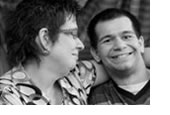Late Onset (LOTS)
Tay-Sachs, Sandhoff, GM1 diseases
 This page describes:
This page describes:
Speech and Voice Challenges
How a Speach-Language Pathologist May Help
Tips for Improving Communication
Speech and Voice Challenges
Speech is a common challenge for people living with Late Onset (LOTS) Tay-Sachs, Sandhoff or GM1 diseases. It can affect all aspects of enjoying a full and active life. Ways to help including working with a Speech language pathologist and reading Tips for Improving Communication, from NTSAD.
Problems with communication vary in nature and severity from person to person. Although there are commonalities, no two people with LOTS are exactly alike. As the disease progresses, the variability continues. Many people talk so quickly their words run together, while others drop the endings of their words. Whatever the problem a Speech Language Pathologist can help.
If you have LOTS, the following list summarizes problems that you may experience at different stages of the disease. In many cases, you may experience the same areas of difficulty throughout the course of the disease, often with increasing severity over time.
Communication challenges may be caused by any of the following:
- Dysarthria (muscular weakness, slowness, or in-coordination of the lips, tongue, throat, and jaw)
- Apraxia (disruption in programming and sequencing muscle movements for speech)
- Diminished rate control (talking too fast or too slowly)
- Poor voice quality (hoarse/harsh, breathy, volume too low or too high)
- Dis-coordination of breathing and voice
- Mis-articulations (incorrect pronunciation of sounds)
- Lack of initiation (inability to initiate conversation)
- Perseveration (getting "stuck" on certain words or phrases, repeating them often and at inappropriate times)
- Difficulty with monitoring pragmatic skills (turn-taking in conversation; reduced ability to maintain a topic or switch topics appropriately)
- Stuttering (difficulty beginning a word or sentence, with repetition of sounds)
- Difficulty understanding information
- Difficulty reading and writing
- Short responses, only responds with one or two words
- Omitting context which provides cues to the listener
How a speech-language pathologist (SLP) can help
If you are affected with LOTS, a speech-language pathologist can be helpful at all stages of the disease. In the early stages, a SLP can assist with problem solving and developing strategies to overcome communication challenges and help you continue to live a more full and empowered life.
Early intervention and involvement with therapeutic professionals is best because you can learn compensatory strategies more successfully during the early stages of LOTS and can then apply them throughout the course of the disease.
A SLP may recommend use of augmentative or alternative communication devices and techniques, which can be as simple as a word/picture board, or more complex, such as an electronic device that speaks for you.
For example, the SLP might work with you and your family to create a word/picture board tailored to your environment (whether it be a private residence or a long-term care facility) or flexible enough to be carried around. If an electronic device might be beneficial, the SLP, will evaluation your interest and motivation to use it, and will help make it easily accessible.
What to Expect?
During a speech-language appointment the pathologist:
- will take a careful history of medical conditions and symptoms
- will look at the strength and movement of the muscles involved in swallowing
- will observe feeding to see posture, behavior, and oral movements during eating and drinking
- may perform special tests to evaluate swallowing
It is very important for individuals with LOTS to seek speech-language therapy in order to address speech issues and maximize their ability to express themselves and communicate. Speech-language therapy can also help you address swallowing problems and help prevent respiratory infections caused by aspiration.
How to Find a Speech Language Pathologist?
Generally your treating physician provides the referral. The SLP will coordinate with your overall health care providers and may possibly be covered by your medical insurance.
American Speech-Language-Hearing Association (ASHA) provides an online directory of Audiology and Speech-Language Pathology Programs. Their searchable database contains listings of more than 7,000 programs that employ audiologists and speech-language pathologists who hold the Certificate of Clinical Competence (CCC) from ASHA. Find a speech-language pathologist at www.asha.org.
Tips for Improving Communications
For the speaker -
- Speak more slowly
- Say one word at a time
- Repeat the word or sentence when necessary
- Rephrase the sentence
- Exaggerate the sounds
- Speak louder (take deep breath before speaking)
- Use gestures
- Keep sentences short
- Provide context for what you are saying
- As a supplement to speech, use alternative communication techniques such as word boards, alphabet boards, picture boards, electronic devices
For the listener -
- Eliminate distractions (TV's, radios, large groups of people)
- Keep questions/statements simple
- Ask one question at a time
- Use yes/no question format as much as possible
- Pay attention to gestures and facial expressions/changes
- If you do not understand what is being said, don't pretend that you do. Ask for clarification, or repeat what you think was said in the form of a question, such as, "Did you say...?"
- Try to keep to familiar topics
- Allow enough time for the person to convey his/her message
Most importantly, be patient!

